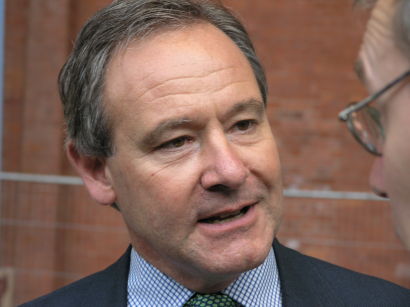THE REVIEW of franchising by Eurostar chairman Richard Brown has concluded that the system is not fundamentally flawed, and that a major reorganisation would 'risk throwing the baby out with the bathwater'. But he has identified a need for better focus and the employment of some 'hard hitters' to deal with franchises on behalf of the Government, and has spelt out some key options to transport minister Patrick McLoughlin.
Basically, there are three ways forward, Mr Brown told Railnews. One is to move franchising away from the DfT to a new standalone body which could resemble the former Strategic Rail Authority or more probably its smaller predecessor OPRAF.
The second is to create a new agency to handle franchising within the DfT structure, like the Highways Agency, while the third is to leave the present arrangements roughly unchanged, with a group of DfT civil servants within the Department's Rail Group responsible for assessing bids and monitoring the performance of contracted operators.
It was flaws within the DfT Rail Group which triggered the franchising crisis last autumn, when the transport secretary was forced to withdraw the award of the intercity West Coast franchise to FirstGroup after runner-up Virgin had mounted a legal challenge to the accuracy of the DfT's calculations about the risks posed by each bid.
Franchising is currently on hold following the West Coast collapse, and Mr Brown is urging an early restart to the negotiations. Three franchises are due to end this year, while the Government had also intended to return the currently state-run East Coast operation to the private sector in December.
Mr Brown said it was not true, as some critics had claimed, that franchising was 'broken'. He pointed to the many successes since privatisation and the continuing growth in demand for rail, where passenger figures are now approaching an all-time record.
He told Railnews that it was 'important not to have a false start' when franchising resumes. He also examined the possibility of concessions replacing franchises and thus removing the commercial risk which they involve for operators.
"I did look at concessions," he told Railnews, and he also agreed that there are some successful examples of such contracts, including the Docklands Light Railway, London Overground and Manchester Metrolink.
He continued: "But all these contracts require a trunk body with the ability to take care of marketing and ticketing, like Transport for London. If you were to create such a trunk for National Rail as a whole, or indeed try to revive the SRA or OPRAF, you would need primary legislation – which would take some time. I don't believe such a delay is justified, because in so many ways franchising has worked.
"What is needed is a new focus and some hard hitters to deal with the details, but we shouldn't be pulling the whole plant out by the roots."
The transport secretary Patrick McLoughlin welcomed Mr Brown's report, and said: "The review has confirmed that government’s approach to rail franchising system is still the best way to secure the rail services for taxpayers and farepayers alike. It has identified a number of detailed improvements, which I will carefully consider before publishing a further statement regarding the government’s franchising policy in the spring."
The Review has received a mixed response from the industry. ATOC said it was important that franchising was restarted, and that operators would now consider the recommendations carefully. Its chief executive Michael Roberts also urged 'clarity' from the DfT about what is to happen next.
FirstGroup UK Rail managing director Vernon Barker said: "The independent review by Richard Brown is an important development for the rail industry as it calls for an early return to refranchising, which has allowed the private sector to provide effective and efficient passenger rail services for many years."
The Chartered Institute of Logistics and Transport also welcomed Richard Brown's conclusions, saying: "The Institute is pleased to see that the report has taken an holistic view of franchising, including an appreciation of the relationship between the rail industry and its supply chain, which has suffered from the uncertainty following the collapse of the West Coast refranchising process."
However, others were less impressed. TUC general secretary and chair of the Action for Rail campaign Frances O’Grady said: "This report shows how successive models of franchising have failed. However, instead of recognising that privatised rail operators are ill-equipped to provide a sustainable long-term public service, the review concludes that the UK needs more of the same.
"Our current system of corporate welfare – where train operators make a play of bidding for contracts knowing that their future revenue will be underwritten by the taxpayer – sadly looks here to stay."
TSSA general secretary Manuel Cortes added: "The Brown Report is simply the green light for the train operators to carry on printing money at the passenger's expense. The current system is broken but both he and the Secretary of State want to carry on regardless. Rail fares have doubled since the Tories voted to privatise rail 20 years ago and this report means they will carry on rising above the rate of inflation for the next decade as well."


